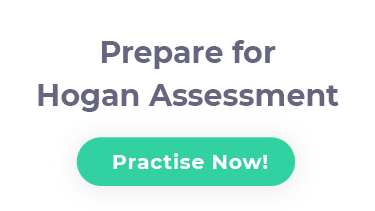Hogan Judgement Assessment Online Preparation – 2025

Some of the smartest people are capable of making the worst mistakes and are unprepared with how to deal with the fallout. Cognitive ability alone is not a good predictor of job-seekers’ decision-making skills, or their ability to handle criticism. The ability to make decisions and face the consequences is an important attribute in those in leadership positions. The researchers at Hogan developed the Hogan Judgment Assessment as a way to try and determine the decision-making abilities of job candidates.
What Is the Hogan Judgement Assessment?
The Hogan Judgement Model
The Hogan Judgement Assessment was designed based on the principals of the Hogan Judgment Model. The Hogan Judgment Model is used to help show individuals the areas of decision making in which they are weak, their strengths, and how these traits make them suitable for different roles. Individuals are not placed into categories, the model describes an individual’s skills based on 3 factors:
- Learn – This describes your learning style, and how quickly you can process complex information. Individuals will be placed in categories based on their learning styles. The categories are:
- Decide – How do you make decisions? Gut feelings, strategic thinking, or tactical thinking.
- Adapt – How well do you adapt to decisions, are you capable of accepting accountability for poor decisions, and will you try a new direction?
The Hogan Judgment Assessment
The test is broken down to measure three things, cognitive ability, bright and dark side personality traits, and values. The test segments are broken down in this way:
Information Processing – This section is made up of verbal and numerical reasoning questions. This is used to help determine your learning style and the way in which you best process information. Are you a number person, or are you better at communicating verbally? Individuals will be categorized based on the way they process information:
- Qualitative – These are the individuals who are better with words than numbers. They typically thrive in fields involving communication.
- Quantitative – These people are good at working with numbers and interpreting patterns. They tend to gravitate toward fields like IT and finance.
- Deliberate – People who take time to think over all the available information, and do not rush so they can be accurate, fall into this category. These individuals do well in detail-oriented work
- Versatile – these are the people who are equally good at both verbal and numerical reasoning. They are good at making quick decisions and do not require an abundance of information to form fairly accurate conclusions.
Decision Making Approaches – This segment helps determine the way in which you make decisions. It is made up of three scales.
- Threat avoidance vs reward-seeking – Are you an individual who is cautious in decision making, or are you focused on the potential reward? Each style is necessary, but they tend to do well in different roles.
- Tactical thinking vs strategic thinking – Do you focus on the immediate needs and issues, or are you a big picture thinker, who focuses on the long term.
- Data-driven decisions vs intuitive decisions – Are you capable of confidently making a quick decision, or do you require information and time to process and take a more considered approach.
Reactions to Feedback – This segment will show employers how you respond to feedback regarding your decisions:
- Defensive vs cool-headed – Are you emotional and quick to reassign blame, or are you capable of taking critique and exploring ways you can improve in the future?
- Denial vs acceptance – Do you attempt to deny failure, or try to spin it as a success, or are you able to accept the facts and address your mistakes?
- Superficial vs genuine – Do you pretend to accept critique, but in reality, do it to save face, and make no changes, or do you accept it graciously and learn from your mistakes?
The Hogan Judgment Report
The Hogan Judgment Report is generated from the results of the Hogan Judgment Test. It provides employers with in-depth descriptions of the learning styles of the test-takers, their decision-making style, and the way they respond to constructive feedback. The focus of the Hogan Judgment Report is to show how well job candidates accept accountability for their decisions, and not if they are “good” or “bad” decision-makers. This is based on the concept that accountability and openness to critique are important parts of demonstrating good judgment.
How to Prepare for the Hogan Judgment Assessment?
The Hogan Judgment Assessment relies on personality versus cognitive factors. Even the cognitive section of the test is meant to demonstrate which areas you are strongest in, and not your cognitive abilities. You can best prepare by making yourself familiar with the various Hogan assessments. Explore their website and learn about their testing methods and their views on personality testing. Hogan’s philosophy stresses the importance of measuring an individual’s personality traits against a job profile for the best chance of success.
Conclusion
The Hogan Judgement Test is an innovative new tool in the realm of psychometric testing. Hogan considers all styles of decision making valid. As long as you are able to accept feedback in a constructive manner and learn from the mistakes, we are all capable of making, you will soon be matched to the position that is perfect for you.

